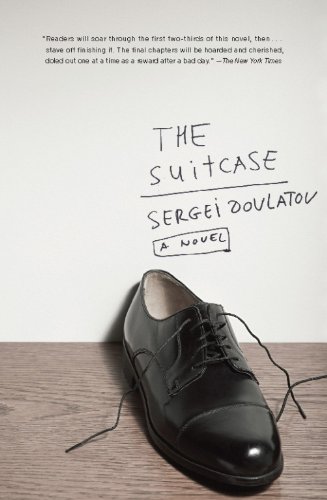The Suitcase: A Novel
Sergei Dovlatov’s subtle, dark-edged humor and wry observations are in full force in The Suitcase as he examines eight objects—the items he brought with him in his luggage upon his emigration from the U.S.S.R. These seemingly undistinguished possessions, stuffed into a worn-out suitcase, take on a riotously funny life of their own as Dovlatov inventories the circumstances under which he acquired them, occasioning a brilliant series of interconnected tales: A poplin shirt evokes the bittersweet story of a courtship and marriage, while a pair of boots (of the kind only the Nomenklatura can afford) calls up the hilarious conclusion to an official banquet. Some driving gloves—remnants of Dovlatov’s short-lived acting career—share space with neon-green crepe socks, reminders of a failed black-market scam. And in curious juxtaposition, the belt from a prison guard’s uniform lies next to a stained jacket that once belonged to Fernand Léger.
Imbued with a comic nostalgia overlaid with Dovlatov’s characteristically dry wit, The Suitcase is an intensely human, delightfully ironic novel from “the finest Soviet satirist to appear in English since Vladimir Voinovich.”



































A Brilliant Lens Through Which to View Soviet Life Since my college days, I have been a voracious reader of Russian authors, especially the great classical novelists. I recently read and reviewed a book by a contemporary Russian author, and had an e-mail conversation with a close friend who lives and works in Moscow. When I told him the name of the author whose work I had recently completed, he sneered and said,”Here in Russia, we consider this ‘airport reading.’ If you want to read a more modern Russian novelist, you should tackle Sergei…
In sparse prose, Sergei Dovlatov shares chapters from his misspent Soviet youth in memorable style drawing everyday items out from a mythical suitcase that was all he was allowed to take out when he left Russia. There is no attempt to link his various experiences as a conscript, journalist, construction worker or small time black marketeer into any kind of narrative. Each chapter stands alone and captures moments bizarre, moving or confused of a corrupt system which brutalised its own people…
A funny, caustic, clever and perceptive insider’s view of Soviet Union dysfunction–and its dysfunctional, alcoholic people–crafted in a series of quasi-fictional vignettes by one of its victims. The book depicts the surreal, threadbare and hopeless lives of those cynically resigned to their dark fate in a corrupt and ill-conceived system that all strive to outwit, if only to get a free drink or warm hat. As Dovlatov writes: “Once I watched a documentary about Paris during the Occupation…